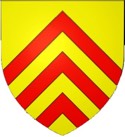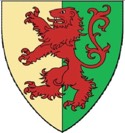Clayton - Person Sheet
Clayton - Person Sheet
Misc. Notes
Isabel de Clare, Countess of Pembroke and Striguil, was a Cambro-Norman-Irish noblewoman and one of the wealthiest heiresses in Wales and Ireland.[1] She was the wife of William Marshal, 1st Earl of Pembroke, who served four successive kings as Lord Marshal of England. Her marriage had been arranged by King Richard I.
Spouses
1MARSHALL, William I 
 , 27G Grandfather
, 27G Grandfather

 , 27G Grandfather
, 27G GrandfatherBirth Dateaft 1144
Birth PlacePembroke, Pembrokeshire, Wales
Occupation1st Earl of Pembroke
Death Date14 May 1219 Age: 75
Death PlaceChelsea, London, England
Misc. Notes
William Marshal, 1st Earl of Pembroke, also called William the Marshal (Norman French: Williame le Mareschal), was an Anglo-Norman soldier and statesman.[1] He served five English kings – The "Young King" Henry, Henry II, Richard I, John, and Henry III.
Although inexplicably omitted from schoolroom history he has a dozen claims to fame. He unhorsed Richard, the future King Richard I, the Lionheart, in battle and spared his life. He loyally served five Plantagenate kings, including Richard his erstwhile enemy, who had the sense to recognise Marshal's qualities.
He defeated over 500 opponents in single combat, knighted two kings, ruled England as Regent, beat a powerful French army on English soil, saved the kingdom of England, and earned the respect of Europe. He was called “The Flower of Chivalry”. Stephen Langton, the Archbishop of Canterbury, described him as the "greatest knight that ever lived". Every king and great nobleman in Europe had an officer called a marshal, but by the time of his death in 1219 the whole of Europe knew William as “The Marshall”.
King Stephen. William’s childhood was not easy. A generation after William the Conqueror, war raged between Stephen and Matilda, rivals for the English throne. When King Stephen besieged Newbury Castle (at Hamstead Marshall) in 1152, Stephen used the young William as a hostage to ensure that his father John Marshal surrendered the castle. John pretended to consider, but used the time to reinforce the castle and to alert Matilda's forces. Stephen then ordered John to surrender immediately or watch as he hanged William in front of the castle. John replied with the words "I still have the hammer and the anvil with which to forge yet more and better sons!". Stephen loaded William into a trebuchet ready to shoot him into the castle, but in the end could not bring himself to kill the boy. Instead William became a favourite at the royal court.
As a younger son of a minor nobleman, William had no lands to inherit. Around the age of twelve he was sent to Normandy to be trained as a knight in the household of William de Tancarville, a cousin of his mother.
He was knighted in 1166 on campaign in Upper Normandy. Leaving the Tancarville household he served in the household of his mother's brother, Patrick, Earl of Salisbury. In 1168 he accompanied the Earl as part of a Eleanor of Aquitaine's escort. The earl was killed in an ambush by Guy de Lusignan. William was injured but kept fighting long enough to allow Eleanor to escape. He was later ransomed by Eleanor, who had heard of his bravery.
At liberty, he made a living out of winning tournaments. Tournaments were at that time dangerous – often deadly – battles, far from the showy jousting contests that they would later become late on. Money, armour, horses and valuable prizes could be won by capturing and ransoming opponents. William’s record on the tournament circuit became legendary. No modern counterpart exists, but some idea of his fame and presige might be imagined by combining the world's most famous footballer with the world heavywieght boxing champion and equestrian Olympic gold medalist
Although inexplicably omitted from schoolroom history he has a dozen claims to fame. He unhorsed Richard, the future King Richard I, the Lionheart, in battle and spared his life. He loyally served five Plantagenate kings, including Richard his erstwhile enemy, who had the sense to recognise Marshal's qualities.
He defeated over 500 opponents in single combat, knighted two kings, ruled England as Regent, beat a powerful French army on English soil, saved the kingdom of England, and earned the respect of Europe. He was called “The Flower of Chivalry”. Stephen Langton, the Archbishop of Canterbury, described him as the "greatest knight that ever lived". Every king and great nobleman in Europe had an officer called a marshal, but by the time of his death in 1219 the whole of Europe knew William as “The Marshall”.
King Stephen. William’s childhood was not easy. A generation after William the Conqueror, war raged between Stephen and Matilda, rivals for the English throne. When King Stephen besieged Newbury Castle (at Hamstead Marshall) in 1152, Stephen used the young William as a hostage to ensure that his father John Marshal surrendered the castle. John pretended to consider, but used the time to reinforce the castle and to alert Matilda's forces. Stephen then ordered John to surrender immediately or watch as he hanged William in front of the castle. John replied with the words "I still have the hammer and the anvil with which to forge yet more and better sons!". Stephen loaded William into a trebuchet ready to shoot him into the castle, but in the end could not bring himself to kill the boy. Instead William became a favourite at the royal court.
As a younger son of a minor nobleman, William had no lands to inherit. Around the age of twelve he was sent to Normandy to be trained as a knight in the household of William de Tancarville, a cousin of his mother.
He was knighted in 1166 on campaign in Upper Normandy. Leaving the Tancarville household he served in the household of his mother's brother, Patrick, Earl of Salisbury. In 1168 he accompanied the Earl as part of a Eleanor of Aquitaine's escort. The earl was killed in an ambush by Guy de Lusignan. William was injured but kept fighting long enough to allow Eleanor to escape. He was later ransomed by Eleanor, who had heard of his bravery.
At liberty, he made a living out of winning tournaments. Tournaments were at that time dangerous – often deadly – battles, far from the showy jousting contests that they would later become late on. Money, armour, horses and valuable prizes could be won by capturing and ransoming opponents. William’s record on the tournament circuit became legendary. No modern counterpart exists, but some idea of his fame and presige might be imagined by combining the world's most famous footballer with the world heavywieght boxing champion and equestrian Olympic gold medalist


